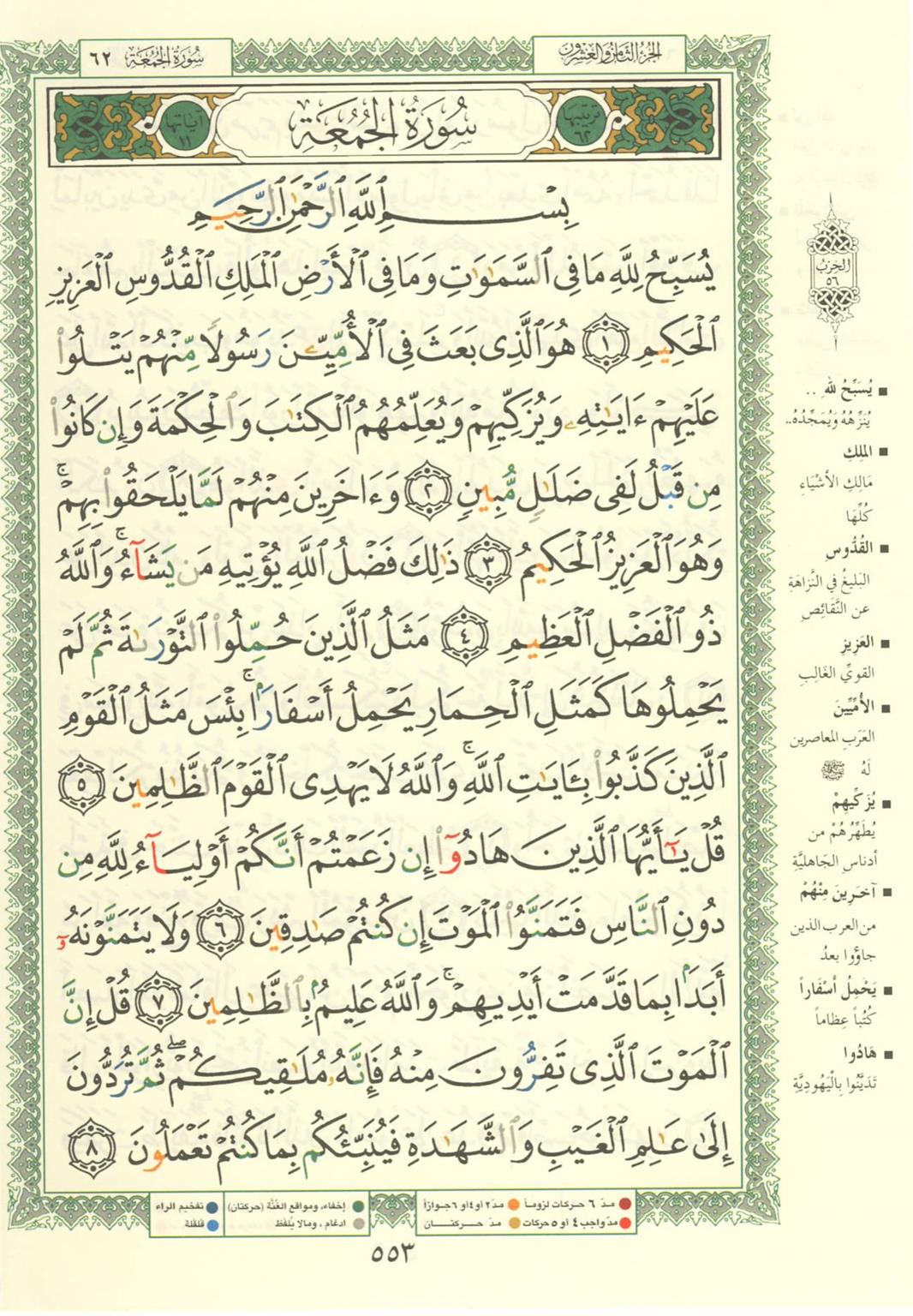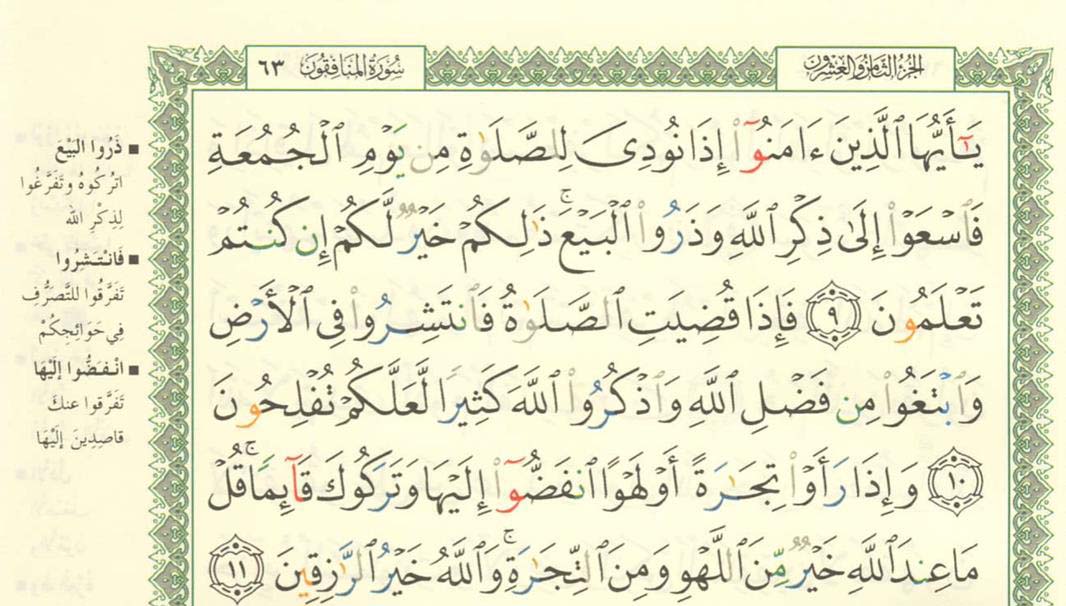Surah Juma
Contents


Page 553
62:1
س-ب-ح
![]() يُسَبِّحُ
یُسَبِّحُ
yusabbiḥu
Glorifies
يُسَبِّحُ
یُسَبِّحُ
yusabbiḥu
Glorifies
ا-ل-ه
![]() لِلَّهِ
لِلّٰهِ
lillahi
Allah
لِلَّهِ
لِلّٰهِ
lillahi
Allah
م-ا
![]() مَا
مَا
mā
whatever
مَا
مَا
mā
whatever
ف-ي
![]() فِي
فِی
fī
(is) in
فِي
فِی
fī
(is) in
س-م-و
![]() ٱلسَّمَٰوَٰتِ
السَّمٰوٰتِ
s-samāwāti
the heavens
ٱلسَّمَٰوَٰتِ
السَّمٰوٰتِ
s-samāwāti
the heavens
م-ا
![]() وَمَا
وَمَا
wamā
and whatever
وَمَا
وَمَا
wamā
and whatever
ف-ي
![]() فِي
فِی
fī
(is) in
فِي
فِی
fī
(is) in
ا-ر-ض
![]() ٱلۡأَرۡضِ
الْاَرْضِ
l-arḍi
the earth,
ٱلۡأَرۡضِ
الْاَرْضِ
l-arḍi
the earth,
م-ل-ك
![]() ٱلۡمَلِكِ
الْمَلِكِ
l-maliki
the Sovereign,
ٱلۡمَلِكِ
الْمَلِكِ
l-maliki
the Sovereign,
ق-د-س
![]() ٱلۡقُدُّوسِ
الْقُدُّوْسِ
l-qudūsi
the Holy,
ٱلۡقُدُّوسِ
الْقُدُّوْسِ
l-qudūsi
the Holy,
ع-ز-ز
![]() ٱلۡعَزِيزِ
الْعَزِیْزِ
l-ʿazīzi
the All-Mighty,
ٱلۡعَزِيزِ
الْعَزِیْزِ
l-ʿazīzi
the All-Mighty,
ح-ك-م
![]() ٱلۡحَكِيمِ
الْحَكِیْمِ
l-ḥakīmi
the All-Wise.
ٱلۡحَكِيمِ
الْحَكِیْمِ
l-ḥakīmi
the All-Wise.
62:2
ه-و
![]() هُوَ
هُوَ
huwa
He
هُوَ
هُوَ
huwa
He
ا-ل-ل-ذ
![]() ٱلَّذِي
الَّذِیْ
alladhī
(is) the One Who
ٱلَّذِي
الَّذِیْ
alladhī
(is) the One Who
ب-ع-ث
![]() بَعَثَ
بَعَثَ
baʿatha
sent
بَعَثَ
بَعَثَ
baʿatha
sent
ف-ي
![]() فِي
فِی
fī
among
فِي
فِی
fī
among
ا-م-م
![]() ٱلۡأُمِّيِّـۧنَ
الْاُمِّیّٖنَ
l-umiyīna
the unlettered
ٱلۡأُمِّيِّـۧنَ
الْاُمِّیّٖنَ
l-umiyīna
the unlettered
ر-س-ل
![]() رَسُولٗا
رَسُوْلًا
rasūlan
a Messenger
رَسُولٗا
رَسُوْلًا
rasūlan
a Messenger
م-ن
![]() مِّنۡهُمۡ
مِّنْهُمْ
min'hum
from themselves
مِّنۡهُمۡ
مِّنْهُمْ
min'hum
from themselves
ت-ل-و
![]() يَتۡلُواْ
یَتْلُوْا
yatlū
reciting
يَتۡلُواْ
یَتْلُوْا
yatlū
reciting
ع-ل-ي
![]() عَلَيۡهِمۡ
عَلَیْهِمْ
ʿalayhim
to them
عَلَيۡهِمۡ
عَلَیْهِمْ
ʿalayhim
to them
ا-ي-ا
![]() ءَايَٰتِهِۦ
اٰیٰتِهٖ
āyātihi
His Verses,
ءَايَٰتِهِۦ
اٰیٰتِهٖ
āyātihi
His Verses,
ز-ك-و
![]() وَيُزَكِّيهِمۡ
وَیُزَكِّیْهِمْ
wayuzakkīhim
and purifying them
وَيُزَكِّيهِمۡ
وَیُزَكِّیْهِمْ
wayuzakkīhim
and purifying them
ع-ل-م
![]() وَيُعَلِّمُهُمُ
وَیُعَلِّمُهُمُ
wayuʿallimuhumu
and teaching them
وَيُعَلِّمُهُمُ
وَیُعَلِّمُهُمُ
wayuʿallimuhumu
and teaching them
ك-ت-ب
![]() ٱلۡكِتَٰبَ
الْكِتٰبَ
l-kitāba
the Book
ٱلۡكِتَٰبَ
الْكِتٰبَ
l-kitāba
the Book
ح-ك-م
![]() وَٱلۡحِكۡمَةَ
وَالْحِكْمَةَ ۗ—
wal-ḥik'mata
and the wisdom
وَٱلۡحِكۡمَةَ
وَالْحِكْمَةَ ۗ—
wal-ḥik'mata
and the wisdom
ا-ن
![]() وَإِن
وَاِنْ
wa-in
although
وَإِن
وَاِنْ
wa-in
although
ك-و-ن
![]() كَانُواْ
كَانُوْا
kānū
they were
كَانُواْ
كَانُوْا
kānū
they were
م-ن
![]() مِن
مِنْ
min
before
مِن
مِنْ
min
before
ق-ب-ل
![]() قَبۡلُ
قَبْلُ
qablu
before
قَبۡلُ
قَبْلُ
qablu
before
ف-ي
![]() لَفِي
لَفِیْ
lafī
surely in
لَفِي
لَفِیْ
lafī
surely in
ض-ل-ل
![]() ضَلَٰلٖ
ضَلٰلٍ
ḍalālin
an error
ضَلَٰلٖ
ضَلٰلٍ
ḍalālin
an error
ب-ي-ن
![]() مُّبِينٖ
مُّبِیْنٍ
mubīnin
clear.
مُّبِينٖ
مُّبِیْنٍ
mubīnin
clear.
62:3
ا-خ-ر
![]() وَءَاخَرِينَ
وَّاٰخَرِیْنَ
waākharīna
And others
وَءَاخَرِينَ
وَّاٰخَرِیْنَ
waākharīna
And others
م-ن
![]() مِنۡهُمۡ
مِنْهُمْ
min'hum
among them
مِنۡهُمۡ
مِنْهُمْ
min'hum
among them
ل-م-م-ا
![]() لَمَّا
لَمَّا
lammā
who have not yet joined
لَمَّا
لَمَّا
lammā
who have not yet joined
ل-ح-ق
![]() يَلۡحَقُواْ
یَلْحَقُوْا
yalḥaqū
who have not yet joined
يَلۡحَقُواْ
یَلْحَقُوْا
yalḥaqū
who have not yet joined
ب
![]() بِهِمۡۚ
بِهِمْ ؕ—
bihim
them;
بِهِمۡۚ
بِهِمْ ؕ—
bihim
them;
ه-و
![]() وَهُوَ
وَهُوَ
wahuwa
and He
وَهُوَ
وَهُوَ
wahuwa
and He
ع-ز-ز
![]() ٱلۡعَزِيزُ
الْعَزِیْزُ
l-ʿazīzu
(is) the All-Mighty,
ٱلۡعَزِيزُ
الْعَزِیْزُ
l-ʿazīzu
(is) the All-Mighty,
ح-ك-م
![]() ٱلۡحَكِيمُ
الْحَكِیْمُ
l-ḥakīmu
the All-Wise.
ٱلۡحَكِيمُ
الْحَكِیْمُ
l-ḥakīmu
the All-Wise.
62:4
ذ-ل-ك
![]() ذَٰلِكَ
ذٰلِكَ
dhālika
That
ذَٰلِكَ
ذٰلِكَ
dhālika
That
ف-ض-ل
![]() فَضۡلُ
فَضْلُ
faḍlu
(is the) Bounty of Allah,
فَضۡلُ
فَضْلُ
faḍlu
(is the) Bounty of Allah,
ا-ل-ه
![]() ٱللَّهِ
اللّٰهِ
l-lahi
(is the) Bounty of Allah,
ٱللَّهِ
اللّٰهِ
l-lahi
(is the) Bounty of Allah,
ا-ت-ي
![]() يُؤۡتِيهِ
یُؤْتِیْهِ
yu'tīhi
He gives it
يُؤۡتِيهِ
یُؤْتِیْهِ
yu'tīhi
He gives it
م-ن
![]() مَن
مَنْ
man
(to) whom
مَن
مَنْ
man
(to) whom
ش-ي-ا
![]() يَشَآءُۚ
یَّشَآءُ ؕ—
yashāu
He wills.
يَشَآءُۚ
یَّشَآءُ ؕ—
yashāu
He wills.
ا-ل-ه
![]() وَٱللَّهُ
وَاللّٰهُ
wal-lahu
And Allah
وَٱللَّهُ
وَاللّٰهُ
wal-lahu
And Allah
ذ-و
![]() ذُو
ذُو
dhū
(is the) Possessor of Bounty
ذُو
ذُو
dhū
(is the) Possessor of Bounty
ف-ض-ل
![]() ٱلۡفَضۡلِ
الْفَضْلِ
l-faḍli
(is the) Possessor of Bounty
ٱلۡفَضۡلِ
الْفَضْلِ
l-faḍli
(is the) Possessor of Bounty
ع-ظ-م
![]() ٱلۡعَظِيمِ
الْعَظِیْمِ
l-ʿaẓīmi
the Great.
ٱلۡعَظِيمِ
الْعَظِیْمِ
l-ʿaẓīmi
the Great.
62:5
م-ث-ل
![]() مَثَلُ
مَثَلُ
mathalu
(The) likeness
مَثَلُ
مَثَلُ
mathalu
(The) likeness
ا-ل-ل-ذ
![]() ٱلَّذِينَ
الَّذِیْنَ
alladhīna
(of) those who
ٱلَّذِينَ
الَّذِیْنَ
alladhīna
(of) those who
ح-م-ل
![]() حُمِّلُواْ
حُمِّلُوا
ḥummilū
were entrusted
حُمِّلُواْ
حُمِّلُوا
ḥummilū
were entrusted
ت-و-ر-ا
![]() ٱلتَّوۡرَىٰةَ
التَّوْرٰىةَ
l-tawrāta
(with) the Taurat
ٱلتَّوۡرَىٰةَ
التَّوْرٰىةَ
l-tawrāta
(with) the Taurat
ث-م-م
![]() ثُمَّ
ثُمَّ
thumma
then
ثُمَّ
ثُمَّ
thumma
then
ل-م
![]() لَمۡ
لَمْ
lam
not
لَمۡ
لَمْ
lam
not
ح-م-ل
![]() يَحۡمِلُوهَا
یَحْمِلُوْهَا
yaḥmilūhā
they bore it,
يَحۡمِلُوهَا
یَحْمِلُوْهَا
yaḥmilūhā
they bore it,
م-ث-ل
![]() كَمَثَلِ
كَمَثَلِ
kamathali
(is) like
كَمَثَلِ
كَمَثَلِ
kamathali
(is) like
ح-م-ر
![]() ٱلۡحِمَارِ
الْحِمَارِ
l-ḥimāri
the donkey
ٱلۡحِمَارِ
الْحِمَارِ
l-ḥimāri
the donkey
ح-م-ل
![]() يَحۡمِلُ
یَحْمِلُ
yaḥmilu
who carries
يَحۡمِلُ
یَحْمِلُ
yaḥmilu
who carries
س-ف-ر
![]() أَسۡفَارَۢاۚ
اَسْفَارًا ؕ—
asfāran
books.
أَسۡفَارَۢاۚ
اَسْفَارًا ؕ—
asfāran
books.
ب-ا-س
![]() بِئۡسَ
بِئْسَ
bi'sa
Wretched is
بِئۡسَ
بِئْسَ
bi'sa
Wretched is
م-ث-ل
![]() مَثَلُ
مَثَلُ
mathalu
(the) example
مَثَلُ
مَثَلُ
mathalu
(the) example
ق-و-م
![]() ٱلۡقَوۡمِ
الْقَوْمِ
l-qawmi
(of) the people
ٱلۡقَوۡمِ
الْقَوْمِ
l-qawmi
(of) the people
ا-ل-ل-ذ
![]() ٱلَّذِينَ
الَّذِیْنَ
alladhīna
who
ٱلَّذِينَ
الَّذِیْنَ
alladhīna
who
ك-ذ-ب
![]() كَذَّبُواْ
كَذَّبُوْا
kadhabū
deny
كَذَّبُواْ
كَذَّبُوْا
kadhabū
deny
ا-ي-ا
![]() بِـَٔايَٰتِ
بِاٰیٰتِ
biāyāti
(the) Signs
بِـَٔايَٰتِ
بِاٰیٰتِ
biāyāti
(the) Signs
ا-ل-ه
![]() ٱللَّهِۚ
اللّٰهِ ؕ—
l-lahi
(of) Allah.
ٱللَّهِۚ
اللّٰهِ ؕ—
l-lahi
(of) Allah.
ا-ل-ه
![]() وَٱللَّهُ
وَاللّٰهُ
wal-lahu
And Allah
وَٱللَّهُ
وَاللّٰهُ
wal-lahu
And Allah
ل-ا
![]() لَا
لَا
lā
(does) not
لَا
لَا
lā
(does) not
ه-د-ي
![]() يَهۡدِي
یَهْدِی
yahdī
guide
يَهۡدِي
یَهْدِی
yahdī
guide
ق-و-م
![]() ٱلۡقَوۡمَ
الْقَوْمَ
l-qawma
the people,
ٱلۡقَوۡمَ
الْقَوْمَ
l-qawma
the people,
ظ-ل-م
![]() ٱلظَّٰلِمِينَ
الظّٰلِمِیْنَ
ẓ-ẓālimīna
the wrongdoers.
ٱلظَّٰلِمِينَ
الظّٰلِمِیْنَ
ẓ-ẓālimīna
the wrongdoers.
62:6
ق-و-ل
![]() قُلۡ
قُلْ
qul
Say,
قُلۡ
قُلْ
qul
Say,
ا-ي-ي
![]() يَٰٓأَيُّهَا
یٰۤاَیُّهَا
yāayyuhā
"O you who are Jews!
يَٰٓأَيُّهَا
یٰۤاَیُّهَا
yāayyuhā
"O you who are Jews!
ا-ل-ل-ذ
![]() ٱلَّذِينَ
الَّذِیْنَ
alladhīna
"O you who are Jews!
ٱلَّذِينَ
الَّذِیْنَ
alladhīna
"O you who are Jews!
ه-و-د
![]() هَادُوٓاْ
هَادُوْۤا
hādū
"O you who are Jews!
هَادُوٓاْ
هَادُوْۤا
hādū
"O you who are Jews!
ا-ن
![]() إِن
اِنْ
in
If
إِن
اِنْ
in
If
ز-ع-م
![]() زَعَمۡتُمۡ
زَعَمْتُمْ
zaʿamtum
you claim
زَعَمۡتُمۡ
زَعَمْتُمْ
zaʿamtum
you claim
ا-ن-ن
![]() أَنَّكُمۡ
اَنَّكُمْ
annakum
that you
أَنَّكُمۡ
اَنَّكُمْ
annakum
that you
و-ل-ي
![]() أَوۡلِيَآءُ
اَوْلِیَآءُ
awliyāu
(are) allies
أَوۡلِيَآءُ
اَوْلِیَآءُ
awliyāu
(are) allies
ا-ل-ه
![]() لِلَّهِ
لِلّٰهِ
lillahi
of Allah.
لِلَّهِ
لِلّٰهِ
lillahi
of Allah.
م-ن
![]() مِن
مِنْ
min
excluding
مِن
مِنْ
min
excluding
د-و-ن
![]() دُونِ
دُوْنِ
dūni
excluding
دُونِ
دُوْنِ
dūni
excluding
ن-و-س
![]() ٱلنَّاسِ
النَّاسِ
n-nāsi
the people,
ٱلنَّاسِ
النَّاسِ
n-nāsi
the people,
م-ن-ي
![]() فَتَمَنَّوُاْ
فَتَمَنَّوُا
fatamannawū
then wish
فَتَمَنَّوُاْ
فَتَمَنَّوُا
fatamannawū
then wish
م-و-ت
![]() ٱلۡمَوۡتَ
الْمَوْتَ
l-mawta
(for) the death,
ٱلۡمَوۡتَ
الْمَوْتَ
l-mawta
(for) the death,
ا-ن
![]() إِن
اِنْ
in
if
إِن
اِنْ
in
if
ك-و-ن
![]() كُنتُمۡ
كُنْتُمْ
kuntum
you are
كُنتُمۡ
كُنْتُمْ
kuntum
you are
ص-د-ق
![]() صَٰدِقِينَ
صٰدِقِیْنَ
ṣādiqīna
truthful."
صَٰدِقِينَ
صٰدِقِیْنَ
ṣādiqīna
truthful."
62:7
ل-ا
![]() وَلَا
وَلَا
walā
But not
وَلَا
وَلَا
walā
But not
م-ن-ي
![]() يَتَمَنَّوۡنَهُۥٓ
یَتَمَنَّوْنَهٗۤ
yatamannawnahu
they will wish for it,
يَتَمَنَّوۡنَهُۥٓ
یَتَمَنَّوْنَهٗۤ
yatamannawnahu
they will wish for it,
ا-ب-د
![]() أَبَدَۢا
اَبَدًا
abadan
ever,
أَبَدَۢا
اَبَدًا
abadan
ever,
ب-م-ا
![]() بِمَا
بِمَا
bimā
for what
بِمَا
بِمَا
bimā
for what
ق-د-م
![]() قَدَّمَتۡ
قَدَّمَتْ
qaddamat
(have) sent forth
قَدَّمَتۡ
قَدَّمَتْ
qaddamat
(have) sent forth
ي-د-ي
![]() أَيۡدِيهِمۡۚ
اَیْدِیْهِمْ ؕ—
aydīhim
their hands.
أَيۡدِيهِمۡۚ
اَیْدِیْهِمْ ؕ—
aydīhim
their hands.
ا-ل-ه
![]() وَٱللَّهُ
وَاللّٰهُ
wal-lahu
And Allah
وَٱللَّهُ
وَاللّٰهُ
wal-lahu
And Allah
ع-ل-م
![]() عَلِيمُۢ
عَلِیْمٌۢ
ʿalīmun
(is) All-Knowing
عَلِيمُۢ
عَلِیْمٌۢ
ʿalīmun
(is) All-Knowing
ظ-ل-م
![]() بِٱلظَّٰلِمِينَ
بِالظّٰلِمِیْنَ
biẓ-ẓālimīna
of the wrongdoers.
بِٱلظَّٰلِمِينَ
بِالظّٰلِمِیْنَ
biẓ-ẓālimīna
of the wrongdoers.
62:8
ق-و-ل
![]() قُلۡ
قُلْ
qul
Say,
قُلۡ
قُلْ
qul
Say,
ا-ن-ن
![]() إِنَّ
اِنَّ
inna
"Indeed,
إِنَّ
اِنَّ
inna
"Indeed,
م-و-ت
![]() ٱلۡمَوۡتَ
الْمَوْتَ
l-mawta
the death
ٱلۡمَوۡتَ
الْمَوْتَ
l-mawta
the death
ا-ل-ل-ذ
![]() ٱلَّذِي
الَّذِیْ
alladhī
which
ٱلَّذِي
الَّذِیْ
alladhī
which
ف-ر-ر
![]() تَفِرُّونَ
تَفِرُّوْنَ
tafirrūna
you flee
تَفِرُّونَ
تَفِرُّوْنَ
tafirrūna
you flee
م-ن
![]() مِنۡهُ
مِنْهُ
min'hu
from it,
مِنۡهُ
مِنْهُ
min'hu
from it,
ا-ن-ن
![]() فَإِنَّهُۥ
فَاِنَّهٗ
fa-innahu
then surely it
فَإِنَّهُۥ
فَاِنَّهٗ
fa-innahu
then surely it
ل-ق-ي
![]() مُلَٰقِيكُمۡۖ
مُلٰقِیْكُمْ
mulāqīkum
(will) meet you.
مُلَٰقِيكُمۡۖ
مُلٰقِیْكُمْ
mulāqīkum
(will) meet you.
ث-م-م
![]() ثُمَّ
ثُمَّ
thumma
Then
ثُمَّ
ثُمَّ
thumma
Then
ر-د-د
![]() تُرَدُّونَ
تُرَدُّوْنَ
turaddūna
you will be sent back
تُرَدُّونَ
تُرَدُّوْنَ
turaddūna
you will be sent back
ا-ل-ي
![]() إِلَىٰ
اِلٰی
ilā
to
إِلَىٰ
اِلٰی
ilā
to
ع-ل-م
![]() عَٰلِمِ
عٰلِمِ
ʿālimi
(the) All-Knower
عَٰلِمِ
عٰلِمِ
ʿālimi
(the) All-Knower
غ-ي-ب
![]() ٱلۡغَيۡبِ
الْغَیْبِ
l-ghaybi
(of) the unseen
ٱلۡغَيۡبِ
الْغَیْبِ
l-ghaybi
(of) the unseen
ش-ه-د
![]() وَٱلشَّهَٰدَةِ
وَالشَّهَادَةِ
wash-shahādati
and the witnessed,
وَٱلشَّهَٰدَةِ
وَالشَّهَادَةِ
wash-shahādati
and the witnessed,
ن-ب-ا
![]() فَيُنَبِّئُكُم
فَیُنَبِّئُكُمْ
fayunabbi-ukum
and
فَيُنَبِّئُكُم
فَیُنَبِّئُكُمْ
fayunabbi-ukum
and
ب-م-ا
![]() بِمَا
بِمَا
bimā
[of] what
بِمَا
بِمَا
bimā
[of] what
ك-و-ن
![]() كُنتُمۡ
كُنْتُمْ
kuntum
you used to
كُنتُمۡ
كُنْتُمْ
kuntum
you used to
ع-م-ل
![]() تَعۡمَلُونَ
تَعْمَلُوْنَ
taʿmalūna
do."
تَعۡمَلُونَ
تَعْمَلُوْنَ
taʿmalūna
do."
62:9
ا-ي-ي
![]() يَٰٓأَيُّهَا
یٰۤاَیُّهَا
yāayyuhā
O you who believe!
يَٰٓأَيُّهَا
یٰۤاَیُّهَا
yāayyuhā
O you who believe!
ا-ل-ل-ذ
![]() ٱلَّذِينَ
الَّذِیْنَ
alladhīna
O you who believe!
ٱلَّذِينَ
الَّذِیْنَ
alladhīna
O you who believe!
ا-م-ن
![]() ءَامَنُوٓاْ
اٰمَنُوْۤا
āmanū
O you who believe!
ءَامَنُوٓاْ
اٰمَنُوْۤا
āmanū
O you who believe!
ا-ذ-ا
![]() إِذَا
اِذَا
idhā
When
إِذَا
اِذَا
idhā
When
ن-د-ي
![]() نُودِيَ
نُوْدِیَ
nūdiya
(the) call is made
نُودِيَ
نُوْدِیَ
nūdiya
(the) call is made
ص-ل-و
![]() لِلصَّلَوٰةِ
لِلصَّلٰوةِ
lilṣṣalati
for (the) prayer
لِلصَّلَوٰةِ
لِلصَّلٰوةِ
lilṣṣalati
for (the) prayer
م-ن
![]() مِن
مِنْ
min
on
مِن
مِنْ
min
on
ي-و-م
![]() يَوۡمِ
یَّوْمِ
yawmi
(the) day
يَوۡمِ
یَّوْمِ
yawmi
(the) day
ج-م-ع
![]() ٱلۡجُمُعَةِ
الْجُمُعَةِ
l-jumuʿati
(of) Friday,
ٱلۡجُمُعَةِ
الْجُمُعَةِ
l-jumuʿati
(of) Friday,
س-ع-ي
![]() فَٱسۡعَوۡاْ
فَاسْعَوْا
fa-is'ʿaw
then hasten
فَٱسۡعَوۡاْ
فَاسْعَوْا
fa-is'ʿaw
then hasten
ا-ل-ي
![]() إِلَىٰ
اِلٰی
ilā
to
إِلَىٰ
اِلٰی
ilā
to
ذ-ك-ر
![]() ذِكۡرِ
ذِكْرِ
dhik'ri
(the) remembrance
ذِكۡرِ
ذِكْرِ
dhik'ri
(the) remembrance
ا-ل-ه
![]() ٱللَّهِ
اللّٰهِ
l-lahi
(of) Allah
ٱللَّهِ
اللّٰهِ
l-lahi
(of) Allah
و-ذ-ر
![]() وَذَرُواْ
وَذَرُوا
wadharū
and leave
وَذَرُواْ
وَذَرُوا
wadharū
and leave
ب-ي-ع
![]() ٱلۡبَيۡعَۚ
الْبَیْعَ ؕ—
l-bayʿa
the business.
ٱلۡبَيۡعَۚ
الْبَیْعَ ؕ—
l-bayʿa
the business.
ذ-ل-ك
![]() ذَٰلِكُمۡ
ذٰلِكُمْ
dhālikum
That
ذَٰلِكُمۡ
ذٰلِكُمْ
dhālikum
That
خ-ي-ر
![]() خَيۡرٞ
خَیْرٌ
khayrun
(is) better
خَيۡرٞ
خَیْرٌ
khayrun
(is) better
ل
![]() لَّكُمۡ
لَّكُمْ
lakum
for you,
لَّكُمۡ
لَّكُمْ
lakum
for you,
ا-ن
![]() إِن
اِنْ
in
if
إِن
اِنْ
in
if
ك-و-ن
![]() كُنتُمۡ
كُنْتُمْ
kuntum
you
كُنتُمۡ
كُنْتُمْ
kuntum
you
ع-ل-م
![]() تَعۡلَمُونَ
تَعْلَمُوْنَ
taʿlamūna
know.
تَعۡلَمُونَ
تَعْلَمُوْنَ
taʿlamūna
know.
62:10
ا-ذ-ا
![]() فَإِذَا
فَاِذَا
fa-idhā
Then when
فَإِذَا
فَاِذَا
fa-idhā
Then when
ق-ض-ي
![]() قُضِيَتِ
قُضِیَتِ
quḍiyati
is concluded
قُضِيَتِ
قُضِیَتِ
quḍiyati
is concluded
ص-ل-و
![]() ٱلصَّلَوٰةُ
الصَّلٰوةُ
ṣ-ṣalatu
the prayer,
ٱلصَّلَوٰةُ
الصَّلٰوةُ
ṣ-ṣalatu
the prayer,
ن-ش-ر
![]() فَٱنتَشِرُواْ
فَانْتَشِرُوْا
fa-intashirū
then disperse
فَٱنتَشِرُواْ
فَانْتَشِرُوْا
fa-intashirū
then disperse
ف-ي
![]() فِي
فِی
fī
in
فِي
فِی
fī
in
ا-ر-ض
![]() ٱلۡأَرۡضِ
الْاَرْضِ
l-arḍi
the land
ٱلۡأَرۡضِ
الْاَرْضِ
l-arḍi
the land
ب-غ-ي
![]() وَٱبۡتَغُواْ
وَابْتَغُوْا
wa-ib'taghū
and seek
وَٱبۡتَغُواْ
وَابْتَغُوْا
wa-ib'taghū
and seek
م-ن
![]() مِن
مِنْ
min
from
مِن
مِنْ
min
from
ف-ض-ل
![]() فَضۡلِ
فَضْلِ
faḍli
(the) Bounty of Allah,
فَضۡلِ
فَضْلِ
faḍli
(the) Bounty of Allah,
ا-ل-ه
![]() ٱللَّهِ
اللّٰهِ
l-lahi
(the) Bounty of Allah,
ٱللَّهِ
اللّٰهِ
l-lahi
(the) Bounty of Allah,
ذ-ك-ر
![]() وَٱذۡكُرُواْ
وَاذْكُرُوا
wa-udh'kurū
and remember
وَٱذۡكُرُواْ
وَاذْكُرُوا
wa-udh'kurū
and remember
ا-ل-ه
![]() ٱللَّهَ
اللّٰهَ
l-laha
Allah
ٱللَّهَ
اللّٰهَ
l-laha
Allah
ك-ث-ر
![]() كَثِيرٗا
كَثِیْرًا
kathīran
much
كَثِيرٗا
كَثِیْرًا
kathīran
much
ل-ع-ل-ل
![]() لَّعَلَّكُمۡ
لَّعَلَّكُمْ
laʿallakum
so that you may
لَّعَلَّكُمۡ
لَّعَلَّكُمْ
laʿallakum
so that you may
ف-ل-ح
![]() تُفۡلِحُونَ
تُفْلِحُوْنَ
tuf'liḥūna
succeed.
تُفۡلِحُونَ
تُفْلِحُوْنَ
tuf'liḥūna
succeed.

